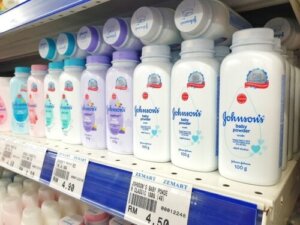This Is Why Johnson & Johnson Will Stop Selling its Baby Powder

Pharmaceutical company Johnson & Johnson (J&J) announced that it will discontinue worldwide sales of its popular baby powder from 2023. The decision was taken two years after ending sales of this product in the United States and Canada after receiving multiple lawsuits for suspicions about its safety.
Through a brief statement, the company informed that it made the “business decision” to replace its talcum powder products with corn starch. Even so, it withdrew its position on the safety of its cosmetic talc, arguing that scientific analyses have proven that it doesn’t contain asbestos and doesn’t cause cancer.
Why is Johnson & Johnson suspending the sale of its talcum powder?
As reported in a publication of the British newspaper The Guardian, the pharmaceutical company Johnson & Johnson (J&J) has been facing thousands of lawsuits for years from women who have developed ovarian cancer after using its talcum powder products on a regular basis.
And while their stance on the safety of the product remains firm, they reported in a brief note that they intend to “transition” from the talc base for their powders to corn starch. They point to purely commercial reasons, but the announcement puts them back in the eye of the storm, especially among those who point out that the company was aware of the harmful effects of the product.
“We continually evaluate and optimize our portfolio to better position the business for long-term growth.his transition will help simplify our product offerings, deliver sustainable innovation and meet the needs of our consumers and evolving global trends.” The company noted in the statement.

We think you may also enjoy reading this article: What Foods Should You Not Feed Your 9 Month Old Baby?
J&J assures there’s nothing to fear
Despite multiple lawsuits, and the penalties it has faced over the issue, Johnson & Johnson (J&J) stands by the idea that its talcum powder-including the famous Johnson’s Baby Powder is safe for consumers.
“Our position on the safety of our cosmetic talc remains unchanged. We strongly support decades of independent scientific analysis by medical experts around the world confirming that Johnson’s talc-based baby powder is safe, doesn’t contain asbestos and doesn’t cause cancer,” he pointed out.
Johnson & Johnson and the controversial lawsuits against its talcum powder
For several years now, Johnson & Johnson’s talcum powder has been in the midst of controversy over its possible link to the development of ovarian cancer. In 2017, a Los Angeles court in California (United States) ordered the company to pay $417 million to a 63-year-old woman who developed ovarian cancer from applying baby powder to her intimate area for several years.
According to the jury’s argument, the company failed to adequately warn about the potential risks of the product and its link to this disease. It further noted that J&J had been aware of these dangers for several years. Subsequently, the U.S. Food and Drug Administration (FDA) found small amounts of asbestos in J&J talcum powder, forcing the company to recall a batch of more than 33,000 bottles of the product from the market.
In 2020 – and amid thousands upon thousands of lawsuits – the company decided to suspend sales of talcum powder in North America, given the drop in sales it had as a result of what they termed “misinformation.”
Today, they continue to face legal challenges in the quest to defend the safety of their products.

Like this article? You may also like to read: How to Color Your Hair Without Using Chemicals
What does science say about talcum powder and ovarian cancer?
Scientific opinions on the use of talcum powder and its relationship to ovarian cancer are divided. While some doubt the involvement of this product in the development of the disease, others warn that there are potential risks and enough evidence to suspect the link.
In fact, a review shared in 2021 in New Solutions points out that for many years the misconception has been spread that cosmetic talc has been free of asbestos – the carcinogenic compound-since 1976. However, the experts caution that “no detectable asbestos” is not the same as “asbestos-free.”
They suggest, among other things, that industry has been responsible for influencing the spread of that false belief. For this reason, they point out that researchers should maintain their efforts to demonstrate the damage they can cause to human and environmental health with concrete evidence.
For its part, a publication in the National Center for Health Research states that studies involving women who use talcum powder link the use of this product with a 30% increase in the probability of contracting ovarian cancer compared to those who don’t use it.
And while it points out that there are still questions to be answered, the article concludes that scientific evidence has shown a consistent link between talcum powder and ovarian cancer. Thus, it suggests that it’s best to avoid talcum powder to avoid the risk.
All cited sources were thoroughly reviewed by our team to ensure their quality, reliability, currency, and validity. The bibliography of this article was considered reliable and of academic or scientific accuracy.
- Johnson & Johnson to stop selling baby powder in US and Canada. (2020).The Guardian. Available in https://www.theguardian.com/business/2020/may/19/johnson-johnson-baby-powder-us-canada
- Johnson & Johnson to stop making talc-based baby powder globally. (2022). The Guardian. Available in https://www.theguardian.com/business/2022/aug/12/johnson-and-johnson-to-stop-making-talc-based-baby-powder-globally
- Condenan a Johnson & Johnson a pagar US$417 millones a mujer que desarrolló cáncer tras usar sus productos de talco. (2017). BBC News Mundo. Disponible en https://www.bbc.com/mundo/noticias-41009768
- Johnson & Johnson recalls baby powder after asbestos found. (2019). The Guardian. Available in https://www.theguardian.com/business/2019/oct/18/johnson-johnson-baby-powder-recall-asbestos
- Casey R, Larkin TP. Ovarian Cancer and “Tainted Talc”: What Treating Physicians Need to Know. Mo Med. 2019 Mar-Apr;116(2):83-86. PMID: 31040485; PMCID: PMC6461309.
- Bird T, Steffen JE, Tran TH, Egilman DS. A Review of the Talc Industry’s Influence on Federal Regulation and Scientific Standards for Asbestos in Talc. New Solut. 2021 Aug;31(2):152-169. doi: 10.1177/1048291121996645. Epub 2021 Feb 27. PMID: 33641519; PMCID: PMC8261788.
- Zuckerman D, Seymour M. (n.d.). Talcum Powder and Ovarian Cancer. National Center for Health Research. Available in https://www.center4research.org/talc-and-ovarian-cancer/
- Cramer DW, Vitonis AF, Terry KL, Welch WR, Titus LJ. The Association Between Talc Use and Ovarian Cancer: A Retrospective Case-Control Study in Two US States. Epidemiology. 2016 May;27(3):334-46. doi: 10.1097/EDE.0000000000000434. PMID: 26689397; PMCID: PMC4820665.
This text is provided for informational purposes only and does not replace consultation with a professional. If in doubt, consult your specialist.








